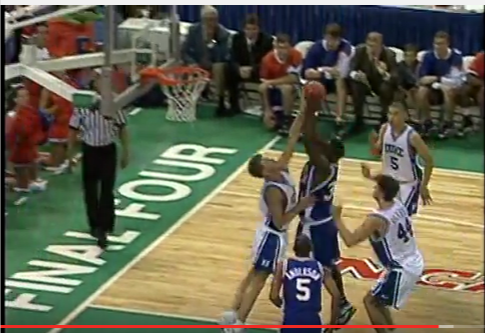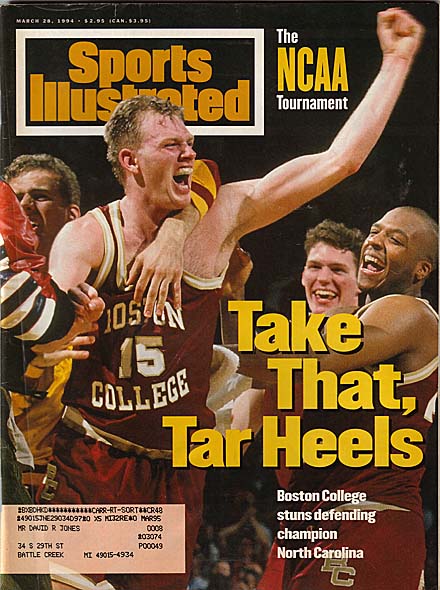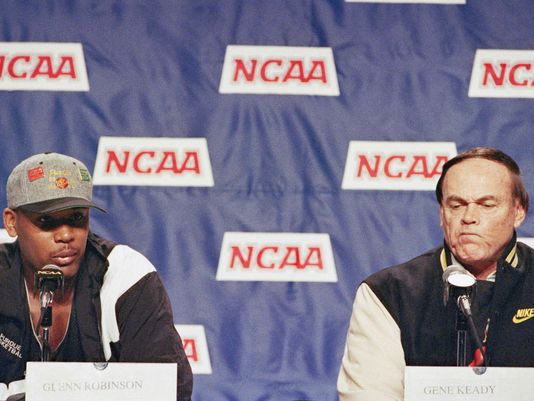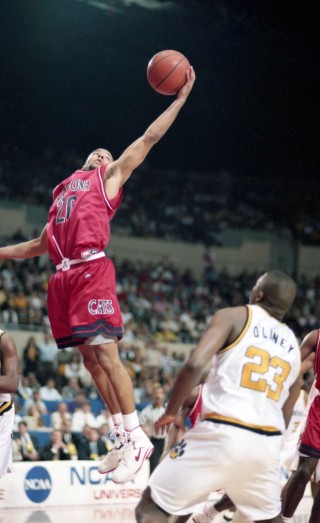The Final Four is its own inherent reward — for Lon Kruger and anyone else who is able to reach college basketball’s biggest weekend as a participant, not a spectator.
Lon Kruger wasn’t concerned with making the Final Four again, 22 years after his first visit. He was focused on making sure Buddy Hield and the rest of his Oklahoma players reached the destination worthy of their talents and aspirations. That’s what will fulfill Kruger when he looks back on this 2016 season with the Sooners.
Nevertheless: 22 years between Final Four visits marks a very long interval… and creates a supremely satisfying feeling upon one’s return. Jay Wright of Villanova, like Kruger, will coach his second Final Four on Saturday in game one. Wright’s seven years between visits don’t exactly comprise a “short” period, but compared to Kruger, that period’s not very long at all.
Here is Kruger’s feat, placed into a larger historical perspective:
Lon Kruger waited 22 years between Final Four trips. Second-longest span, trailing Ray Meyer, who led DePaul to FF in '43 and '79 (36 years)
— David Worlock (@DavidWorlock) March 27, 2016
Ray Meyer was at least able to know the satisfaction of getting back to the Final Four once after his maiden voyage in 1943, when the event was relatively obscure and less prestigious than the NIT. Yet, Meyer’s career — hugely successful if measured from November through February — was profoundly snake-bitten in March. Meyer took so many great teams into the Big Dance and so rarely reached his sport’s biggest showcase.
Kruger hasn’t carried that same burden in his career. He’s been the Mr.-Fix-It of college basketball coaches. He acquired a reputation as something of a nomad who leaves programs better than when he found them, but not at Cadillac programs such as Kentucky or UCLA, where Final Fours are expected. Kruger very rarely coached a team skilled enough to be a top-two seed in the NCAA tournament. Yet, when he got his hands on a 2 seed this season, he guided Oklahoma to the promised land. The 22 years between Final Fours aren’t stained with regret for Kruger; he just hasn’t been that kind of coach, at programs which demand Final Four-level brilliance on a regular basis.
This second Final Four for Kruger is not a long-delayed “should have been done many years ago” moment. It’s a crowning bookend which makes his career a lot more complete. Being able to win a first Final Four game on Saturday against Villanova — being able to then coach in a first national title game — would lend even more completeness to Kruger’s basketball journey.
Yet, that’s a separate concern. The 22 years Lon Kruger has traveled since his 1994 Florida team lost to Duke in Charlotte form a bridge with a different part of college basketball history. Just what was happening in the college hoops world of 1994?
This is not going to be a long and complicated history, just a brief survey of the landscape at the time:
The most significant event of the 1994 NCAA Tournament was also the event which made Lon Kruger’s first Final Four a realistic prospect.
Boston College beat top-seeded North Carolina in the round of 32, dethroning a defending national championship team which was poised to repeat with a loaded roster. Kruger’s Florida team was seeded third in the East Region. Once it got past second-seeded Connecticut in the Sweet 16, Florida was able to play what amounted to an Elite Eight home game in Miami against Boston College, a 9 seed. The Gators won that game to give Kruger his first big net-cutting moment:
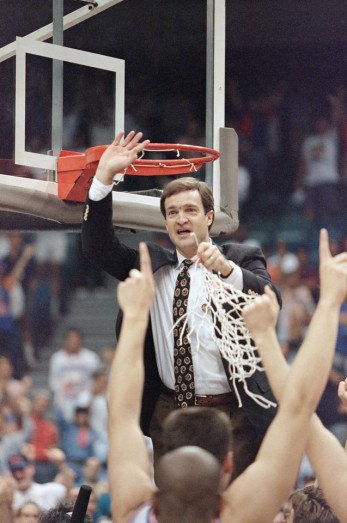
Florida coach Lon Kruger gets a piece of the net after his Florida Gators defeated Boston College in the NCAA East Regional Finals in Miami, Sunday, March 27, 1994 by a score of 74-66. (AP Photo/Hans Deryk)
The Boston College-North Carolina upset didn’t just pave the path for Florida and Kruger; the longstanding historical resonance of that game is that it snapped one of the great streaks in the history of sports, not just college basketball: Dean Smith’s run of 13 straight Sweet 16 appearances with North Carolina in the expanded-field era of the NCAA tournament, from 1981 through 1993.
Gee — win just two NCAA tournament games, one of them against a 15 or 16 seed. Simple, right? Surely many programs have done this for 13 years — Kansas, Duke, UConn, Louisville, Arizona? Nope. Only Carolina has done this since the NCAA field welcomed at-large teams in various power conferences and expanded to 40 in 1979 and 48 in 1980.
What else happened in 1994?
One event reminded a much younger Lon Kruger how hard it is to make even one Final Four:
Gene Keady coached at Purdue for 25 seasons. In that quarter of a century, Keady won multiple Big Ten titles and took a number of Boilermaker teams to the NCAA tournament with a top-3 seed. His best team was his 1994 squad, with Glenn “Big Dog” Robinson (above, left). The Boilermakers were the top seed in the Southeast Regional, but second-seeded Duke — coached by Mike Krzyzewski, and led on the court by Grant Hill — topped Purdue in Knoxville’s Elite Eight encounter.
Keady — like John Chaney and Ralph Miller and a few other great coaches one can call to mind from the 1980s — never made a Final Four. Great talent doesn’t guarantee great success in a sport played by 19- and 20-year-olds.
Also in the 1994 NCAA Tournament, a school from the Midwest — playing in a regional other than the Midwest — felt a sting similar to Purdue, but on a broader and deeper level.
Purdue had made the Final Four before Keady came aboard. When the top-seeded Boilermakers fell in the Southeast Regional final, they didn’t bear the burden of a school which had never tasted the Final Four.
When top-seeded Missouri went to the West Regional in Los Angeles, on the other hand, the Tigers were searching for history. Coach Norm Stewart wanted a first Final Four for himself, but he was trying to bring Missouri to college basketball’s biggest Four-some for the first time ever. When Damon Stoudemire (left) dominated the West Regional final at the L.A. Sports Arena, Missouri had no chance against the second-seeded Arizona Wildcats.
Missouri, to this day, still hasn’t made the Final Four. With 26 NCAA tournament appearances, Mizzou is second only to BYU (29) in terms of having the most Big Dance invites without a Final Four.
The image you see above is a screengrab from the 1994 Midwest Regional semifinal between Tulsa (dark jerseys) and Arkansas (white). Why is this game also worth including in a recollection of the college basketball world of 1994?
Very simply, this game pitted two of the four African-American coaches to win the NCAA tournament: Nolan Richardson of Arkansas won the national title three games after beating Tulsa. Tubby won his national title four years later, in 1998. The other two coaches are John Thompson (the first) with Georgetown in 1984 and Kevin Ollie with Connecticut in 2014.
On one hand, one might think that African-American coaches in a sport played largely by African Americans have not made as much of an imprint as they should have. That’s a separate conversation for a separate column, but it’s worth noting and thinking about.
In the meantime, though, one can look at that 1994 meeting between Nolan and Tubby and appreciate two things:
1) how richly both men achieved in their careers;
2) how influential both careers really were.
First consider that Nolan Richardson had a successful run at Tulsa in the early 1980s. If Nolan hadn’t gone to Tulsa and done well, would Tubby have taken that job years later?
Second: Regardless of the answer to that question, Tubby Smith undeniably raised Tulsa’s profile as a program with his Sweet 16 in 1994, followed by another Sweet 16 in 1995. Because Tubby lifted the visibility level of the Golden Hurricane, other coaches saw the program as a great stepping-stone job on the way to the high majors.
One such coach? Bill Self, who guided Tulsa to the Elite Eight in 2000 and launched what will one day be remembered as a College Basketball Hall of Fame career.
*
That’s just a sampling of the college basketball world in 1994. These events aren’t randomly picked out of a grab bag, either — they all show, in one form or another, how hard it is to succeed, and that success can’t be taken for granted. From North Carolina’s Sweet 16 streak ending to Tulsa improbably making the Sweet 16 and changing the course of college basketball over the next 22 years, 1994 is a sermon about a central life lesson: Nothing is guaranteed.
That’s why Lon Kruger’s second Final Four is so special — for him and for the Oklahoma program which shares his accomplishment this week.

